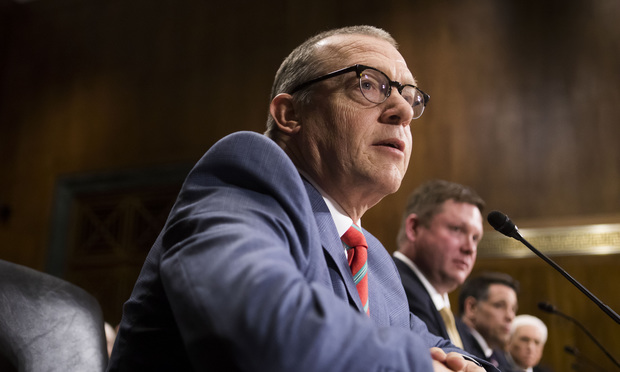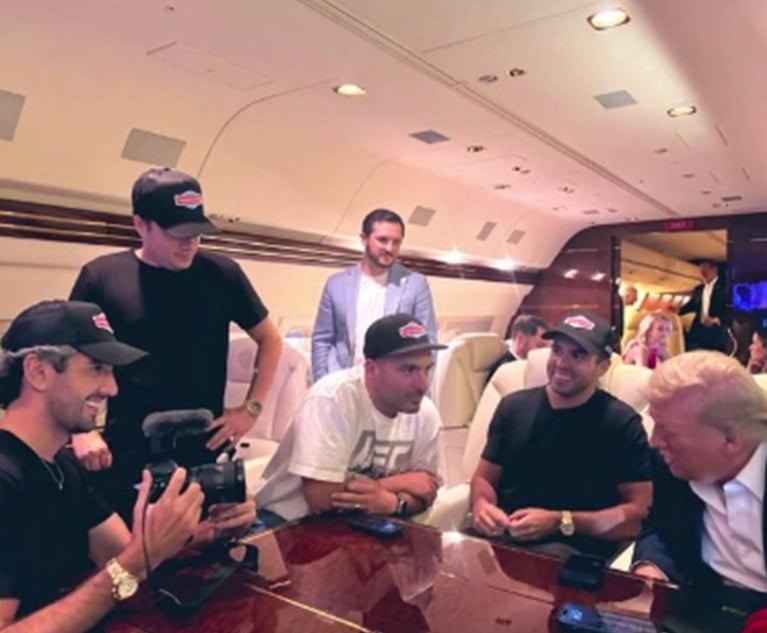Patent Litigation Is on the Rebound, Led by WD-Texas Filings
Some aggressive nonpracticing entities—and perhaps growing interest in litigation funding—have put 2020 district court filings 16% ahead of the previous six months' pace.
July 01, 2020 at 09:22 AM
7 minute read
 U.S. District Judge Alan Albright. (Photo: Diego Radzinschi/ALM)
U.S. District Judge Alan Albright. (Photo: Diego Radzinschi/ALM)
COVID-19 may have taken a big bite out of the economy, but it hasn't slowed down patent infringement litigation.
Fueled by nonpracticing entities, district court filings for the first half of 2020 were up 16% over the previous six months. Most of the upturn came during the second quarter, leading to some speculation that investor reallocation of capital to alternative investments such as litigation funding might be boosting the activity.
Patent owners filed 2,051 district court cases through June 30. That compares to 1,762 for the previous six months and 3,602 for all of 2019.
A year ago, the five most prolific filers of the first half included bio-pharma companies Genentech Inc., InterMune Inc. and Warner Lambert. This year the top five are tech-focused nonpracticing entities: WSOU Investments Inc. and its subsidiary Brazos Licensing and Development; Cedar Lane Technologies Inc.; Castlemorton Wireless LLC; and Symbology Innovations LLC, according to Lex Machina data.
And whereas Delaware led the way in 2019 with 28% of the 2019 filings, the Western District of Texas has now nosed ahead, with 21% of the filings this year to Delaware's 19%.
Unified Patents COO Shawn Ambwani said in an interview last week he believes part of the uptick can be attributed to the increasing issuance of patents from the USPTO, driven in part by the agency's increasing reluctance to disallow applications on eligibility grounds. "Our argument is that lower quality patents are coming through the system," he said.
Fisch Sigler partner Alan Fisch said litigation funding may be a factor as well. "With the current economic dislocation and uncertainty, litigation has become increasingly attractive for some investors," he said. "It's hard to quantify given the limited publicly available data. But it's certainly greater than zero."
WSOU Investments was founded in 2017 and obtained some 4,000 patent assets that year from Nokia and Alcatel-Lucent. According to research by RPX Corp., WSOU shares an address with Coast Asset Management and Juniper Capital Partners. Starting in March the company launched 106 suits against Microsoft Corp.; Huawei Technologies Co. Ltd. and its subsidiaries; ZTE Corp.; Dell Technologies; and Google LLC.
The company has asserted 63 different patents—generally, a single patent family in each individual lawsuit, with a number of cases dismissed and then re-filed. All have been brought in the Western District of Texas. The asserted patents are focused mostly on networking and cloud computing.
Unified's Ambwani said WSOU's approach appears to be new. Typically when multiple patents are asserted against the same entity, they're grouped in the same complaint for efficiency's sake. He said one possible reason for WSOU's tactic could be to reduce the possibility that all of the litigation gets stayed if the PTO were to launch reviews of some portion of the patents.
James Etheridge of Etheridge Law Group, who represents WSOU in its litigation, did not respond to an email requesting comment.
Cedar Lane Technologies clocked in second with 37 suits in 2020. Cedar Lane is a Canadian NPE that RPX describes as asserting former Intellectual Ventures patents on a variety of technologies in "file-and-dismiss fashion" since May 2019. It's represented by Rabicoff Law and several other firms. Castlemorton Wireless was third with 25 suits. Castlemorton is asserting a patent on the detection of carrier signals that it says the British and U.S. governments suppressed for 25 years. It's represented by Berger & Hipskind, Capshaw DeRieux and Bayard.
The Western District of Texas now appears entrenched as the most popular filing destination, following many years of dominance by the Eastern District of Texas that was ended by the Supreme Court's 2017 TC Heartland decision. Delaware then led the pack for a couple of years, but the Western District has been steadily increasing in popularity since U.S. District Judge Alan Albright joined the bench in 2018.
Big tech companies have had less success transferring cases out of the Western District, which includes Austin, because they do more business there than in the Eastern District, and because Albright has been reluctant to grant transfers for convenience purposes. Albright has so far moved cases quickly, leading the PTO to sometimes decline administrative challenges in parallel cases, and he's made clear that he's disinclined to dismiss suits on eligibility grounds in the early stages of litigation. All may be adding to his popularity with patentees.
Delaware is still getting 19% of the cases, while the Eastern District of Texas had 10% during the first half—down from more than 40% during its heyday.
Last year, Delaware had 28% of the new patent filings. The Central District of California, the Eastern District of Texas and the Western District of Texas followed with 10%, 9% and 8%, respectively.
Competitor patent litigation hasn't gone away, either. It remains ahead of 2019′s pace, according to RPX's data, despite the economic downturn. McAndrews, Held & Malloy president Robert Surrette said he believes there are a couple of reasons. One is that some competitor litigation may already have been "in the pipeline" when the economy started contracting. And during tough economic times, "companies are looking for every competitive advantage they can gain," he said.
He also noted that not all segments of the economy are being hurt to the same extent as, say, travel and hospitality. "If they're not tied to a particular area, it might be just business as usual to them," he said.
Administrative challenges at the Patent Trial and Appeal Board are trending up slightly from 2019′s down year. Unified Patents data shows 721 petitions through June 30. That puts them on pace to top last year's 1,320 but would still fall well short of the 1,700 to 1,800 logged the previous four years.
Decisions to institute proceedings appear to be rebounding slightly, from a low water mark of 55% last fall and winter to about 58% in this year's second quarter. That's still down from the low- to mid-60s of the previous five years.
Unified's Ambwani chalked the lower institution rate up partly to the PTAB's more frequent use of discretionary denials—decisions based not on the merits but more on procedural factors such as whether a district court might be able to decide validity more quickly. Fifteen tech and retail advocacy organizations wrote to the House and Senate Judiciary Committees last week to complain that discretionary denials have "significantly weakened" the America Invents Act, which established the framework for administrative challenges.
But not everyone shares that concern. Eldora Ellison, the co-chair of Sterne, Kessler, Goldstein & Fox's Patent Office Litigation Practice, said the increased use of multiple petitions to challenge a single patent—a response to the Supreme Court's 2018 SAS Institute decision—could just as likely explain the modest decline in institution rates. "If you factor out the multiple petitions, that number has actually remained" fairly constant, she said.
PTAB petitioning trends tend to follow district court patent filing trends. Against the backdrop of a shaky stock and bond market, Fisch Sigler's Fisch sees more potential fuel for district court suits. "The longer the economic recovery takes, the more attractive an investment in civil litigation will appear to others," he said.
This content has been archived. It is available through our partners, LexisNexis® and Bloomberg Law.
To view this content, please continue to their sites.
Not a Lexis Subscriber?
Subscribe Now
Not a Bloomberg Law Subscriber?
Subscribe Now
NOT FOR REPRINT
© 2025 ALM Global, LLC, All Rights Reserved. Request academic re-use from www.copyright.com. All other uses, submit a request to [email protected]. For more information visit Asset & Logo Licensing.
You Might Like
View All
'A Warning Shot to Board Rooms': DOJ Decision to Fight $14B Tech Merger May Be Bad Omen for Industry

Apple Files Appeal to DC Circuit Aiming to Intervene in Google Search Monopoly Case
3 minute read
Law Firms Mentioned
Trending Stories
- 1Uber Files RICO Suit Against Plaintiff-Side Firms Alleging Fraudulent Injury Claims
- 2The Law Firm Disrupted: Scrutinizing the Elephant More Than the Mouse
- 3Inherent Diminished Value Damages Unavailable to 3rd-Party Claimants, Court Says
- 4Pa. Defense Firm Sued by Client Over Ex-Eagles Player's $43.5M Med Mal Win
- 5Losses Mount at Morris Manning, but Departing Ex-Chair Stays Bullish About His Old Firm's Future
Who Got The Work
J. Brugh Lower of Gibbons has entered an appearance for industrial equipment supplier Devco Corporation in a pending trademark infringement lawsuit. The suit, accusing the defendant of selling knock-off Graco products, was filed Dec. 18 in New Jersey District Court by Rivkin Radler on behalf of Graco Inc. and Graco Minnesota. The case, assigned to U.S. District Judge Zahid N. Quraishi, is 3:24-cv-11294, Graco Inc. et al v. Devco Corporation.
Who Got The Work
Rebecca Maller-Stein and Kent A. Yalowitz of Arnold & Porter Kaye Scholer have entered their appearances for Hanaco Venture Capital and its executives, Lior Prosor and David Frankel, in a pending securities lawsuit. The action, filed on Dec. 24 in New York Southern District Court by Zell, Aron & Co. on behalf of Goldeneye Advisors, accuses the defendants of negligently and fraudulently managing the plaintiff's $1 million investment. The case, assigned to U.S. District Judge Vernon S. Broderick, is 1:24-cv-09918, Goldeneye Advisors, LLC v. Hanaco Venture Capital, Ltd. et al.
Who Got The Work
Attorneys from A&O Shearman has stepped in as defense counsel for Toronto-Dominion Bank and other defendants in a pending securities class action. The suit, filed Dec. 11 in New York Southern District Court by Bleichmar Fonti & Auld, accuses the defendants of concealing the bank's 'pervasive' deficiencies in regards to its compliance with the Bank Secrecy Act and the quality of its anti-money laundering controls. The case, assigned to U.S. District Judge Arun Subramanian, is 1:24-cv-09445, Gonzalez v. The Toronto-Dominion Bank et al.
Who Got The Work
Crown Castle International, a Pennsylvania company providing shared communications infrastructure, has turned to Luke D. Wolf of Gordon Rees Scully Mansukhani to fend off a pending breach-of-contract lawsuit. The court action, filed Nov. 25 in Michigan Eastern District Court by Hooper Hathaway PC on behalf of The Town Residences LLC, accuses Crown Castle of failing to transfer approximately $30,000 in utility payments from T-Mobile in breach of a roof-top lease and assignment agreement. The case, assigned to U.S. District Judge Susan K. Declercq, is 2:24-cv-13131, The Town Residences LLC v. T-Mobile US, Inc. et al.
Who Got The Work
Wilfred P. Coronato and Daniel M. Schwartz of McCarter & English have stepped in as defense counsel to Electrolux Home Products Inc. in a pending product liability lawsuit. The court action, filed Nov. 26 in New York Eastern District Court by Poulos Lopiccolo PC and Nagel Rice LLP on behalf of David Stern, alleges that the defendant's refrigerators’ drawers and shelving repeatedly break and fall apart within months after purchase. The case, assigned to U.S. District Judge Joan M. Azrack, is 2:24-cv-08204, Stern v. Electrolux Home Products, Inc.
Featured Firms
Law Offices of Gary Martin Hays & Associates, P.C.
(470) 294-1674
Law Offices of Mark E. Salomone
(857) 444-6468
Smith & Hassler
(713) 739-1250









